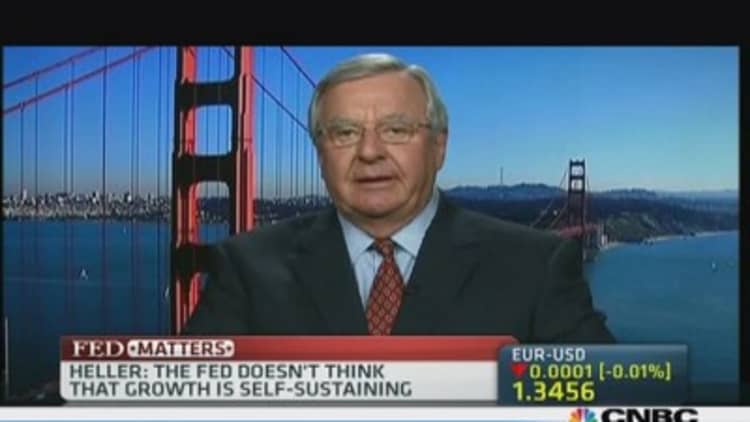The yen dropped to a two-month low against the dollar and a four-year trough versus sterling on Friday after Federal Reserve Chair nominee Janet Yellen's dovish remarks boosted risk appetite, undermining the low-yielding Japanese currency.
Yellen defended the U.S. central bank's stimulus to spur growth and called efforts to boost hiring an "imperative", reinforcing investors' expectations that U.S. monetary stimulus may be in place for an extended period.
The dollar rose as high as 100.31 yen and last stood at 100.26 yen, up 0.2 percent from late U.S levels. The British pound soared above major resistance at 160 yen and rose to 161.14 yen, its highest level since September 2009.
(Read more: Markets soothed by Yellen, watching data)

Even the euro, which was knocked lower against the dollar by weak euro zone data, held its ground at two-week highs versus the yen.
"The yen can only go down now. Yes, we need to be aware of the risk of the Fed's tapering but Yellen is unlikely to do anything drastic. With the world's major central banks all having a dovish bias, we are going to see a rally in risk assets," said a trader at a Japanese bank.
Rising risk tolerance could encourage risk-averse Japanese investors to buy more foreign assets, thereby hurting the yen further.
Following Yellen's remarks, U.S. stocks hit record highs while Japanese shares jumped to a six-month high, heading for their best weekly performance since December 2009.
(Read more: Are the stars re-aligning for dollar-yen?)
On the other hand, the fall in U.S. bond yields following Yellen's comments was too small to discourage investors from buying U.S. debt, thus providing little reason to sell the dollar, said Koji Fukaya, chief executive officer of FPG Securities.
"The yen seems to be the weakest currency of all at the moment. When overall financial markets are risk-on while the U.S.-Japan yield gap does not shrink much, the yen tends to weaken. The yen may keep sliding for the time being," he said.

Sentiment on the yen turned so bearish that the currency even reacted to comments from Finance Minister Taro Aso the previous day that Japan must retain currency intervention as a policy tool, even though he was speaking in theoretical terms.
Hardly any traders expect yen-selling intervention at this stage after the yen has dropped almost 20 percent over the past year on Japan's aggressive monetary easing.
(Read more: For Yellen, it was a perfect hearing)
As the dust settles after Yellen's confirmation hearing, the dollar had mixed fortunes against other currencies.
The euro slipped to $1.3453, pulling back from a one-week high of $1.3499 hit on Thursday.
Investors sold the euro after figures showed the euro area economy all but stagnated in the third quarter, keeping alive expectations the European Central Bank should do more to stimulate growth.
(Read more: Why euro zone slowdown should worry the world)
The British pound fared better, despite disappointment from UK retail sales data on Thursday, as traders bet the Bank of England would have to tighten policy much earlier than it had suggested.
The pound stood at $1.6066, not far from the week's high of $1.6101.
There is no major economic data scheduled for release in Asia on Friday. In Europe, the region's finance ministers will meet in Brussels for a second day to outline plans to deal with banks still in difficulty.

